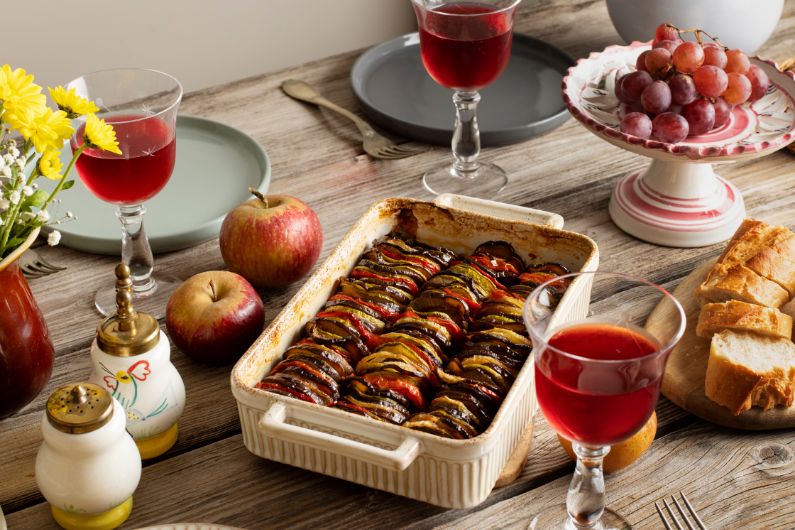Topic
French Cuisine
Exploring the World of French Cuisine: From Tradition to Innovation
French cuisine, renowned for its elegance and complexity, has had a profound influence on culinary arts worldwide.
It embodies a perfect blend of tradition and innovation, showcasing time-honoured techniques and contemporary trends.
Traditional French Cuisine
Historical Background
French cuisine has evolved over centuries, deeply influenced by its royal and aristocratic heritage.
Over time, these grand culinary practices permeated into everyday French life, forming the backbone of what we now recognize as Traditional French Dishes.
Iconic Dishes
Several dishes have become synonymous with French culinary excellence:
- Coq au Vin: A hearty dish of chicken braised with wine, mushrooms, and onions. Originating from Burgundy, it showcases the region’s rich wine culture.
- Bouillabaisse: A traditional Provençal fish stew with a variety of fish and shellfish, flavored with herbs and spices. Its roots lie in the fishing communities of Marseille.
- Boeuf Bourguignon: Another gem from Burgundy, this beef stew is slow-cooked with red wine, garlic, onions, and mushrooms, epitomizing French comfort food.
Regional Specialities
France’s diverse regions contribute unique flavors and specialties:
- Provence: Known for its use of fresh herbs, Provence offers dishes like Ratatouille, a vegetable medley, and Tapenade, a robust olive spread.
- Alsace: This region’s cuisine reflects its German influence, with dishes like Choucroute garnie (sauerkraut with sausages and meats) and Tarte flambée (a thin-crust pizza-like dish).
- Brittany: Famous for its crêpes and galettes, Brittany also boasts an array of seafood delicacies.
French Pastry and Desserts
French pastry and desserts is an art form in itself:
- Croissant: This buttery, flaky pastry is a breakfast staple, beloved worldwide.
- Crème Brûlée: A creamy custard with a caramelized sugar crust, offering a delightful contrast of textures.
- Macarons: These delicate almond meringue cookies, filled with ganache or buttercream, are a testament to French Pastry Techniques.
Culinary Techniques
Classic Techniques
French cooking techniques form the foundation of Western culinary education:
- Sautéing, Braising, Poaching: Essential methods for preparing meats and vegetables.
- Mother Sauces: The five French Sauces and Condiments (Béchamel, Velouté, Espagnole, Hollandaise, and Tomate) are the basis for many French dishes.
- Pastry Techniques: Mastering laminated doughs (for croissants), choux pastry (for éclairs and profiteroles), and pâte à choux are crucial skills for any pastry chef.
Modern Techniques
Innovation continues to shape French cuisine:
- Sous-vide: Cooking food in a vacuum-sealed bag at a precise temperature for extended periods, ensuring perfect doneness and flavor.
- Molecular Gastronomy: Pioneered by scientists like Hervé This, this approach uses chemistry to transform textures and create new dining experiences.
- Farm-to-Table Movement: Emphasizing fresh, local ingredients, this movement advocates for sustainable and ethical eating practices.
Contemporary Innovations
Fusion Cuisine
Modern French chefs often blend traditional techniques with global flavors:
- Mixing classic French methods with Asian spices or South American ingredients creates exciting and novel dishes.
- Chefs like Pierre Gagnaire are known for their adventurous fusion cuisine, constantly pushing culinary boundaries.
Sustainable and Ethical Eating
Contemporary French cuisine increasingly prioritizes sustainability:
- Organic Farming: Many chefs now source ingredients from organic farms to ensure quality and sustainability.
- Sustainable Seafood: Choosing seafood from sustainable sources helps preserve marine ecosystems.
French Culinary Culture
Dining Etiquette
French dining customs reflect the country’s culinary sophistication:
- Meals are structured with multiple courses, each paired with appropriate wines.
- Dining etiquette emphasizes politeness and the enjoyment of food as a communal experience.
Culinary Education
France is home to some of the world’s most prestigious French Cooking Schools:
- Le Cordon Bleu: Offers comprehensive training in classic French techniques.
- Career Paths: Graduates often pursue careers in top restaurants, pâtisseries, or as culinary instructors.
Food Markets and Festivals
French markets and festivals celebrate the country’s rich culinary heritage:
- Famous Markets: French Food Markets like Marché des Enfants Rouges in Paris and Marché d’Aligre are bustling hubs of fresh produce and artisanal products.
- Culinary Festivals: Events like the Fête de la Gastronomie and Lyon’s Festival of Lights highlights France’s vibrant food culture.
Notable French Chefs
Historical Figures
The foundations of modern French cuisine were laid by visionary chefs:
- Marie-Antoine Carême: Known as the father of haute cuisine, he introduced elaborate, decorative dishes.
- Auguste Escoffier: Modernized French cooking and established kitchen brigade systems still used today.
Contemporary Icons
Today’s chefs continue to promote French cuisine:
- Alain Ducasse: His innovations and global restaurant empire have made him a culinary legend.
- Anne-Sophie Pic: As one of the few female chefs with three Michelin stars, her contributions to modern French cuisine are unparalleled.
Emerging Talents
A new generation of chefs is redefining French cuisine:
- They embrace global influences, sustainability, and innovative techniques.
- Social media and global trends play a significant role in their evolving culinary creations.
French Kitchen Essentials
The essential tools for any French kitchen are as follows :
- Copper Pots: Known for their superior heat conductivity
- Mandoline: For slicing vegetables thinly and evenly
The Influence of French Cuisine Abroad
French cuisine has profoundly influenced culinary practices worldwide:
- Techniques and Training: Many international chefs train in France or adopt French techniques in their cooking.
- Global Restaurants: French restaurants and chefs are celebrated across the globe, contributing to a global appreciation of French culinary arts.
- Cultural Exchange: French cuisine continues to evolve, incorporating global flavors and techniques.
The Business of French Food
The French food industry is a significant economic sector:
- Exports: French wines, cheeses, and gourmet products are exported worldwide.
- Gourmet Products: High-quality ingredients like truffles and foie gras.
A Look to the Future
French cuisine remains a dynamic and evolving field, balancing its rich traditions with modern innovations.
As it continues to influence global culinary arts, French cuisine’s future promises to be as vibrant and delectable as its past.
Exploring the diverse regions, varietals, and processes of French wine offers a deeper appreciation for its unparalleled complexity and charm.
